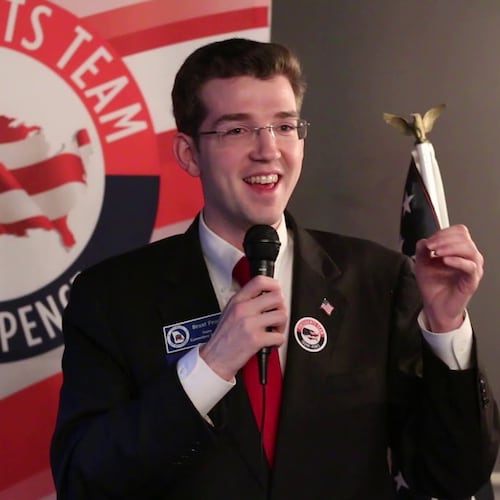In his short term in office, Public Service Commissioner Tim Echols has billed for expenses in excess of $12,300, nearly doubling the spending of the commissioner with the next highest amount and leaving his colleagues to question the legitimacy of his nonstop travel.
He says his “strenuous speaking schedule” and travel are intended to raise the stature of the Public Service Commission, which he believes is part of his job as a commissioner.
Since he took office in January, Echols’ billings for mileage, hotels and meals have included $1,231.42 for a trip to Savannah to showcase his personal compressed natural gas-fueled car in a St. Patrick’s Day parade; $337.62 to Albany for nuclear waste meetings, which coincided with his daughter’s track meet there; and $79.05 in mileage from his Winterville home to the Woodruff Arts Center because he wore a gold PSC name badge and represented the agency.
There have been additional trips to Brunswick, St. Simons and Ossabaw islands, some of them including members of his family.
Echols’ latest venture involves an all-day excursion July 29 on the SAM Shortline Railway; Dubbed “the Solar Express,” he has arranged for seven solar manufacturers to explain sun-fueled energy while riding the train through southwest Georgia. To help set up the event, Echols took his children on a train ride and billed the state for $173.40 in mileage in April.
The publicity he seeks and receives on the trips and his expense reports have drawn criticism from watchdogs, lobbyists and other commissioners. When other members of the PSC were asked for comments on Echols’ travel, they deferred to Chairman Stan Wise, who said it might be time to set a limit on expenses for members of the commission.
“With expense records being public and open to scrutiny, I hesitate to dictate how each elected commissioner performs his duties, but it seems some new controls are now in order,” Wise said of Echols’ expenses.
Echols contends his spending and travel are necessary for him to do his job, which is to serve as a consumer watchdog over the pricing and reliability of telecommunications, transportation, and electric and natural gas services, among others, for Georgians.
“If I don’t go to Albany and to Brunswick and Savannah and Chattanooga and Augusta and Macon, and all the media markets, it is impossible to me to fulfill my goal of increasing the stature of the commission,” said Echols, who was formerly an adviser to former Insurance Commissioner John Oxendine and founder of the nonprofit TeenPact and owner of the for-profit Gold Dome Consulting.
“This is my theory: By increasing the public awareness of the commission, the end result will be a better relationship with the Legislature, greater funding for the commission and voters, and citizens would be able to see that the Public Service Commission can help them out with more things.”
Echols has dwarfed the next-highest PSC expense amounts filed this year, with commissioners Lauren McDonald and Doug Everett submitting $7,747 and $6,169, respectively. McDonald lives in Habersham County and Everett in Albany, and each official bills for mileage to and from the office.
Wise has filed for just $440, covering his stay at the Grove Park Inn in Asheville while attending a Georgia Telephone Association meeting; the chairman has chosen to drive a state vehicle, which is available to all commissioners. Chuck Eaton, a commissioner who lives in Atlanta, has not turned in any expenses with the PSC this year.
The commission is left to police itself and its spending, and, as Wise mentioned, stronger restraints could be imposed because of the board newcomer’s expenses.
William Perry, Common Cause Georgia executive director, doesn’t see a glaring violation of the state’s Ethics in Government Act in Echols’ actions, but he recognizes why the regulator’s business trips have drawn scrutiny.
“Such examples of elected officials traveling at state expense while with their family might give the appearance of impropriety,” Perry said. “I recognize that the PSC performs an essential function, and the public’s awareness of their work is something that definitely needs to be raised.
“However, I think it’s incumbent to make sure that reasonable and relevant expenses are incurred.”
“It’s cases like these why we are pushing for tough ethics reform, so we can close these loopholes like this,” said Debbie Dooley, co-founder of the Georgia Tea Party Patriots.
Echols’ enthusiastic use of media events has rankled co-workers, who see his actions as showboating. However, Echols views this as a necessary means to make things happen, such as boost the economy of southwest Georgia and save its rail line, while boosting the PSC’s profile.
He leans heavily on that argument to justify his travel, speaking engagements and radio, TV and newspaper interviews.
“When I talk about rail, I kind of put on my state leader’s hat,” Echols said. “I kind of take my PSC hat off, and I put my state leader hat on, and I say, ‘How can I use my bully pulpit? How can I use my influence as a state leader to better the life of citizens in towns where their economy is hurting?’ ”
With his energy and visibility, Echols has his supporters.
“He’s fantastic to work with,” John Garrett of the Georgia Motorcoach Operators Association said.
“I hope one day he becomes governor,” Jeff Greene of the Georgia Movers Association said.
Echols’ trip to Albany has brought him the most criticism because it included a family event. He spoke at the GOP state convention, dined with former President Jimmy Carter and participated in media interviews regarding nuclear waste. Yet the interviews were conducted at Hugh Mills Stadium, where his daughter was participating in a high school track meet.
Echols said his daughter didn’t travel or stay with him, and that he was lodged in Americus and paid for the hotel out of campaign funds. Yet he maintained he had the right to bill the PSC for the trip if he wanted, saying, “I felt like I did enough business to justify it.”
On that trip, Echols met Patrick Parker, owner of Parker’s gas outlet and convenience store on St. Simons Island. The store’s roof is covered in solar panels, which drew Echols’ interest. That led to the commissioner taking weekend trips to St. Simons in late May and early June, one to plan a news conference about solar energy and the other to hold the media event at the gas station.
Echols’ sons traveled with him on the first trip, and the family stayed in a hotel paid for by campaign funds — $431.48, according to the latest disclosures filed with the state. On the second trip, Echols had his wife and daughter join him. He expensed the mileage, hotel and his meals — $338.06.
Echols said the trips were business-worthy because they drew the attention of two Savannah TV stations, three newspapers and city and business leaders.
Echols’ son drove the CNG car in Savannah’s St. Patrick’s Day parade while the commissioner worked the crowd, pointing to the car and the compressed natural gas label that included his name. Echols later billed the state for $243.78 in mileage and $374.43 in hotels. Other PSC members have taken part in previous parades, but they paid for the excursions out of their own pockets.
The embattled commissioner concedes he has created conflict and doesn’t criticize the questions sent his way. Yet he admits to no wrongdoing, suggesting only that people need to adjust to him and his well-intentioned actions.
“I’m not going to compromise my principles with anyone,” Echols said. “But I do want to give people time to learn how to work with me, appreciate my style and to see the fruit of my tireless labor out on the road, and I hope that in time people see that.”
That said, Echols has lined up a 10-day trip to France next year to tour some of the country’s 52 nuclear plants and learn how that industry handles spent fuel. He will pay for the trip out of campaign funds rather than expense it.
About the Author
Keep Reading
The Latest
Featured


